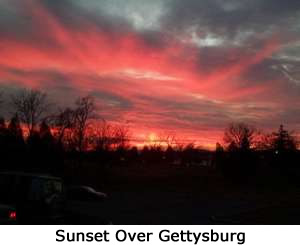
Sunset Over Gettysburg
About Gettysburg
Copyright © 2005-6, Henry J. Sage

Sunset Over Gettysburg
The Battle of Gettysburg was the largest and most famous battle of the American Civil War. Conducted on three consecutive days in July, 1863, the battle marked the last time that Lee's army advanced onto northern soil. When they hundred her so of Lee's men broke through the Union lines on Cemetery Ridge during Pickett's charge on the final day, that was seen as the high water mark of the Confederacy. Like its visit to Gettysburg in November 1863 and his delivery of his inaugural address has also enhanced the position of the battle and American lore, as did the fact that President and Mrs. Eisenhower had a home on a farm in Gettysburg not far from the battlefield.
Whether Gettysburg was the most important battle of the Civil War is debatable; the Battle of Vicksburg, which was concluded on July 4, 1863, the day after the last day of Gettysburg, seals the Mississippi for the union and cut the entire western portion of the Confederacy off from further involvement. It was the first major step in what came to be known as Winfield Scott's and up kind of bland, to surround and crush the Confederacy. The final leg of that plan was completed when Sherman sliced through Georgia in 1864.
But Gettysburg, located just over an hour's drive from the nation's capital and quite accessible from the great cities of Baltimore, Philadelphia, and New York, has received far more attention and a great deal more tourist traffic than the city in central Mississippi. And Gettysburg was important, no doubt about it. It might well be claimed and that what did not happen in Gettysburg was as important as what did. And they figure who was conspicuously absent during the Battle of Gettysburg, General Thomas J. Stonewall Jackson, who was killed the chancellors fill a month earlier, must be considered as an important missing piece for General Lee given the way that the battle was conducted.
In addition, the fact that the Confederates did not win at Gettysburg was far more critical than might be concluded from the fact that even after the union victories the war dragged on for two more years. Some historians have claimed that that made the Battle of Gettysburg less than and determinative; while one can only speculate what might have happened had the Confederacy defeated a union in Gettysburg, it is not hard to imagine that the entire outcome of the war would have been different for a variety of reasons.
Gettysburg is been the subject of a huge volume of literature, a fine movie based upon the fictional work, The killer Angels, and endless articles and debates in various Civil War publications. Entire books have been written about the performance of single regiments at Gettysburg, and a book about the second day by Harry Pfanz runs to 600 pages. Troops are Boy Scouts, and students at military schools of all levels tramp the battlefields at Gettysburg. Busloads of tourists invade the Gettysburg national military Park the year around, and Gettysburg College hosts regular academic conferences dealing with the Civil War in general and Gettysburg in particular.
Visiting the battlefields in the town of Gettysburg today, although the historic parts are well protected and preserved, nevertheless gives one the impression of “Gettysburg: the industry.” That's not all bad, however, for the school children and tourists who leave their dollars in the various souvenir shops take with them books pamphlet lists and mementos that may indeed enrich their understanding of that crucial air of an American history.
To get the full measure of the battle, a visit to Gettysburg is desirable, though not indispensable. For an addition to the fine film, Gettysburg, many documentaries of the battle have been produced and are widely available. Television programs in series on the Civil War have naturally included major segments in Gettysburg as well.
| Civil War Home | Updated December 9, 2013 |